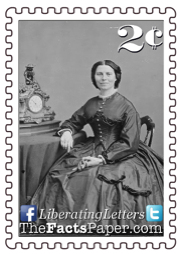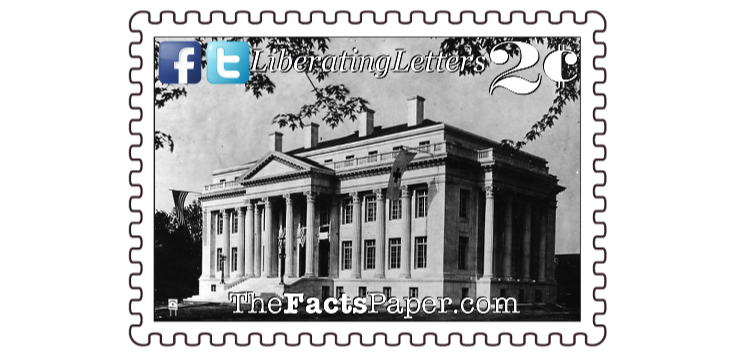The ARC responded to floods, famines and yellow fever almost immediately. In 1897, Clara sent resources to the Ottoman Empire following the Armenian Massacres of 1892–1896 (see Red Sunday), traveling herself to Constantinople, Turkey. While there, she successfully negotiated the first American International Red Cross Headquarters. (see The Ottoman Empire Strikes Back) The following year, she personally assisted with the Spanish-American War in Cuba. (see A Tale Of Two Soldiers and Yellow Journalism: The Birth Of Fake News) The Galveston hurricane of 1900 proved to be Clara’s last operation in the field as ARC’s President. (see Weathering The Storm) However, the biggest disaster was just around the corner.
As the Progressive Era emerged at the turn of the century, many ARC leaders decided they could run the organization better than Clara. As a result, they thanked her for her service and forced her out of the presidency in 1904. Yet this did not stop Clara’s work. Settling into her Glen Echo, Maryland home, Clara founded the National First Aid Society while continuing to give speeches and lectures. She wrote several books, including The Story Of My Childhood. At age 90, she passed away at her home on Good Friday, April 12, 1912, exactly 51 years after the start of the Civil War. (see Sibling Rivalry)
Liberty, Clara once stated, “I have an almost complete disregard of precedent, and a faith in the possibility of something better. It irritates me to be told how things have always been done. I defy the tyranny of precedent.” Oh, how this country has become a slave to precedent, especially in Washington D.C. Likewise, activists today would argue they are fighting it as well. However, the battles they engage in seem to promote division, not Clara’s humanitarian unity.
Pushing against traditional marriage with gay marriage does not house hurricane survivors. (see What Is Love?) Transgender bathrooms do not cloth flood victims. Gay wedding cakes do not feed someone who lost their home to fire. (see We Reserve The Right To Refuse Service) On the other hand, Clara fought to bring people together, not pit them against each other. She helped Union and Confederate soldiers, blacks and whites, men and women. She did not put people in boxes or categories. (see The Great American Melting Pot) Likewise, she pushed for equal, not superior or special rights, for women and blacks. (see The Right's Fight For Rights)
While activists today stand on the streets with their manufactured signs demanding somebody do something, Clara actually changed the world. And she did it not by demanding the government give her money or fund her projects. She raised the money on her own, finding both poor and wealthy people willing to open their pockets on their own free will to help others in need. Furthermore, she not only refused a salary during her time at the Red Cross, she often used her own personal finances to fund relief efforts.
The ARC praises its reformation during the Progressive Era, despite the fact it forced Clara Barton out. Clara not only kept close reigns on the management of the ARC, she insisted on still being in the trenches with those receiving the help. Progressives overtook the ARC, bringing in the government and financiers looking for power while hiring managers who only push papers in a nice office instead of passing out supplies at ground zero. After 100 years of this bureaucratic red tape, the ARC lost its reputation even to hard core leftists devoted to humanitarian efforts. Following the 2017 hurricanes in Houston and Florida, many suggested donating to numerous other organizations, including private and religious ones, as stories of incompetency and disorganization of the ARC circulated. Even a Houston councilman advised citizens to donate elsewhere. (see Weathering The Storm) Clara would be devastated.
ARC leaders sited her over-managerialism as reason for her dismissal. Now, according to National Public Radio (NPR), the ARC has no idea what portion of their donations go to relief efforts. This is progressivism, Liberty, and it never, ever works because it is just another name for socialism. It is just one more example how capitalism, supported by private individuals, has been abducted by government controlled liberalism and once again, become a disaster.
Today’s feminists pride themselves as activists. Yet they march around with pink vagina hats, wearing shirts proclaiming their gratification in having an abortion, convincing themselves they have made a difference. (see Suffering In Utopia) Yet compared to true feminists like Clara, who sincerely fought to save lives and actually changed the world, they are nothing more than whiny, entitled children. Be a Clara Barton, Liberty. She is a true example of a genuine humanitarian and a shining example of an angel on earth.
That’s my 2 cents.
Love,
Mom
However, in true Barton fashion, Clara was down but in no way out. In 1855, she obtained an unprecedented position in the US Patent Office in Washington D.C. As a clerk, Clara not only became the first woman to acquire such a position, she also received equal pay. However, as with the school, the male clerks were merciless. Political pressure soon prevailed as she was reduced to copier, copying sensitive and confidential documents. Nevertheless, in 1856, under Democrat President James Buchanan, Clara was fired due to her “Black Republicanism”. The next year, the Supreme Court delivered the Dred Scott decision, inevitably sealing the seeds of war. (see Dreadful Scott Decision) Following Republican President Abraham Lincoln’s election in 1860, Clara returned to Washington as a copyist, ready to open more doors for women.
The American Civil War saw its first bloodshed on April 19, 1861, in the Baltimore Raid. (see Sibling Rivalry) As 40 wounded soldiers arrived in Washington, Clara’s patriotism kicked into high gear, meeting them at the train station to nurse them. Yet her efforts did not stop there. She and other women both collected and personally provided food, clothing and other supplies to the 6th Massachusetts Militia housed at the Capital Building. It became an intimate mission for Clara as many of the men were childhood friends and some even former students.
Clara’s humanitarianism stretched beyond nursing their physical needs as she also tended to their emotional needs, including writing letters for them to their families, reading them books and talking to them. Her support kept their morale high and outlook positive.
Almost immediately Clara realized her new calling. Learning to collect and properly store medical and other supplies, Clara offered her own home for storage, distributing items to those in need. Moreover, Clara turned to private individuals, not the government, when raising money and provisions. Considering she primarily worked for the Union, her most ardent supporters and suppliers were Republicans. However, Clara helped anyone in need, including wounded and sick Confederate soldiers. While she loved her work, Clara longed to be directly on the battlefield where she could do more, gaining permission in August of 1862 to do just that.
Clara’s efforts were invaluable, especially in such battles as Bull Run, Fredericksburg, and Antietam, where supplies were so scarce doctors were reduced to using cornhusks as bandages. Clara found romance in 1863 with Colonel John J. Elwell, but duty called once again. Appointed “lady in charge” in 1864, she managed the hospitals for the Union Army designated to guarding the James River.
Unafraid, Clara selflessly placed herself in harms way, once again earning the respect of the boys. Bullets flew about her while she tended soldiers and assisted surgeons. She narrowly escaped death on one instance as a bullet ripped through her sleeve to kill the soldier she was nursing. As a result of her bravery, Clara became affectionately known as the “Angel Of The Battlefield”.
Once the war ended, Clara’s attention shifted from helping soldiers to helping their families. Thousands of Americans wrote letters to the War Department desperately seeking news of their loved ones lost in battle. However, due to the nature of war, soldiers were often buried in unmarked graves and later reported as missing on official documents. Determined to give families closure, Clara asked Lincoln for permission to respond to the letters. Lincoln happily agreed, sparking Clara’s "Office of Correspondence with the Friends of the Missing Men of the United States Army”. Clara and her staff spent years researching and finding lost soldiers, and responding to inquiries. Yet that was only part of her work. They not only located and identified 13,000 Union soldiers who died in the Confederate prisoner of war camp at Andersonville, Georgia, Clara oversaw the marking of their graves. An additional 20,000 Union soldiers were found throughout the battle areas and properly buried in marked graves.
Along with her “Missing Men” work, Clara presented lectures throughout the country regarding her war experiences. Furthermore, she met and became close friends with fellow Republicans Susan B. Anthony, Elizabeth Cady Stanton, and Frederick Douglass. They supported her humanitarian work, while she became even more active in the women suffrage and civil rights movements. (see The Right’s Fight For Rights and Reading, Writing, and Redemption)
In her mid-50’s, Clara’s vigorous efforts physically and mentally drained her. Under doctor’s orders, she decided to close her “Missing Men” office. When operations ended in 1868, they had located over 22,000 missing servicemen, and sent off over 63,000 responses to inquiries.
Seeking rest and relaxation in Geneva, Switzerland, Clara discovered the Red Cross and a new mission. While in Europe, the Franco-Prussian War began, giving Clara a chance to see and participate in the Red Cross’s work. Clara was eager to continue the work when Dr. Louis Appia approached her about developing a branch in America. Her time in Switzerland also prompted Clara to push for America to sign the Geneva Convention, which they did.
Upon her return to the states, she immediately began building support. However, many Americans, including President Rutherford B. Hayes, believed the United States would never again face such a tragedy as the Civil War. Therefore, Clara emphasized the scope of the Red Cross’s abilities, including natural disasters such as tornadoes, hurricanes, floods, fires and earthquakes. President Chester Arthur agreed to the new organization of which Clara was elected president.
The first official meeting of the American Red Cross (ARC) occurred in Clara’s Washington D.C. apartment on May 21, 1881. As DC’s Register Of Deeds, Frederick Douglass signed the ARC’s original Articles of Incorporation. The English Evangelical Lutheran Church, located near Clara’s country home in Danville, New York, formed the first local chapter later that year. Philanthropists such as John D. Rockefeller provided enough funds and support for Clara to open a national headquarters near the White House.
May 21, 2018
Dear Liberty,
One of the most well-known and beloved humanitarian organizations began on May 21, 1881, as 59-year-old Clara met with the new members in her apartment. Yet, while Clara Barton made her mark in history with the American Red Cross’s foundation, it is her numerous accomplishments throughout her life that make her a truly priceless individual.
Born on Christmas Day 1821, in North Oxford, Massachusetts, Clarissa Harlowe Barton grew up in the time when the new country was changing from Divine Providence to Manifest Destiny (see God’s Divine Providence and Satan’s Manifest Destiny), leading to Democrat President Andrew Jackson’s Trail of Tears. (see Doctrinally Sound and America's Ongoing Civil War) The daughter of Captain Stephen Barton, patriotism and freedom were in Clara’s blood. So, when the Republican Party formed in 1854 to fight slavery, Clara was completely on board. (see The Birth Of A Movement)
As a child, Clara was shy and timid. However, she found great joy in playing with her brothers and male cousins as they ran through fields, climbed trees, and waded creeks. While her mother made efforts to refine her in lady-like behaviors, the toughness Clara obtained with the boys proved to be a vital trait for the rest of her life. Likewise, the femininity she learned from her female cousin refined proper social skills, which were also pertinent in Clara’s future.
The occupation of choice for young, unmarried women, Clara’s parents encouraged her into teaching in hopes it would also help her conquer her shyness. In 1839, at the age of 17, Clara obtained a teacher’s certificate. For the next 12 years, she not only taught, she worked tirelessly to ensure education for all children. She also campaigned for equal pay for teachers.
Clara quickly gained the respect of her students, especially the rambunctious male children, relying on her childhood experiences to handle them. Following her mother’s death in 1851, Clara continued her studies in New York, where she began a longtime friendship and eventual romance with the principal. However, her work came first as she opened her own public free school in Bordentown. It was the first of its kind in New Jersey, operating off of funds Clara raised from the townspeople. The school grew so large a new building was built. Yet upon its completion, the school board elected a male as president believing the position for such a sizable school was not suitable for a woman. Demoted to “female assistant”, she eventually quit due to health concerns and an intolerable work environment.
ANGEL OF THE BATTLEFIELD





